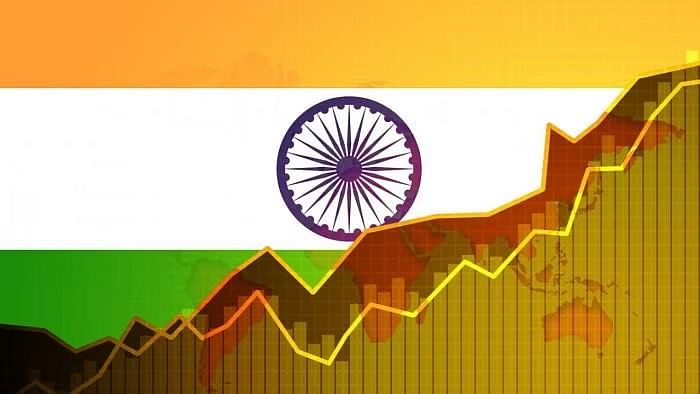
Representative image for economy.
Credit: iStock Photo
New Delhi: The Asian Development Bank (ADB) on Wednesday retained India's growth forecast for the current fiscal at 7 per cent saying better farm output and higher government spending will boost economic activity.
In its Asian Development Outlook (ADO) update of September, the ADB said exports in the current fiscal will be higher than earlier projected, led by larger services exports. However, merchandise export growth will be relatively muted through the next fiscal.
"GDP growth is expected at 7 per cent in fiscal year 2024 (FY2024, ending 31 March 2025) and 7.2 per cent in FY2025, both as forecast in ADO April 2024," the ADB said, adding that India's growth prospects remain robust.
The Indian economy grew 8.2 per cent in the last fiscal (2023-24). The RBI projects growth to be 7.2 per cent in the current fiscal.
It said while GDP growth slowed to 6.7 per cent in the first quarter (April-June) of FY2024, it is expected to accelerate in the coming quarters with the improvement in agriculture and a largely robust outlook for industry and services.
"India's economy has shown remarkable resilience in the face of global geopolitical challenges and is poised for steady growth," ADB Country Director for India Mio Oka said.
"Agricultural improvements will enhance rural spending, which will complement the effects of robust performance of the industry and services sectors," he added.
The report highlights that an above-average monsoon in most parts of the country will lead to strong agricultural growth, enhancing the rural economy in FY2024.
Private consumption is expected to improve, driven by rural consumption fuelled by stronger agriculture and by already robust urban consumption.
The outlook for private investment is upbeat, but growth in public capital expenditure, heretofore high, will moderate in FY2025.
Efforts toward fiscal consolidation are expected to drive down the fiscal deficit to a level last seen before COVID-19, reflecting robust revenue collection and restrained current expenditure, the ADB said.
With the government's fiscal consolidation efforts, central government debt is projected to decrease from 58.2 per cent of GDP in 2023-24 to 56.8 per cent in 2024-25.
The general government deficit, which includes state governments, is expected to fall below 8 per cent of GDP in the current fiscal.
A recent policy announcement offering workers and firms employment-linked incentives could boost labour demand and bolster job creation starting in FY2025, it added.
The Budget 2024-25 has announced three employment-linked incentive schemes and said the government would allocate Rs 2 lakh crore to implement them.
"Growth slowed year-on-year (yoy) in the first quarter (Q1) of FY2024 but is expected to rise in the coming months on improved agricultural performance and higher government spending.
Industry and services are expected to continue performing robustly," the ADB said.
Elevated food prices will likely mean higher inflation in the current fiscal than previously forecast, but inflation should moderate in the next fiscal, the ADB said.
Consumer inflation is anticipated to rise to 4.7 per cent in the current fiscal due to elevated food prices, despite higher agriculture output expectations. This has prevented India’s central bank from adopting a more accommodative monetary policy, the ADB said.
"If improved agricultural supply leads to moderating food price increases, the central bank may begin lowering policy rates in FY2024 (2024-25), enhancing prospects for credit expansion," it said.
The current account deficit will remain moderate, helped by strong service exports and remittances.
ADB projected India's current account deficit to be 1 per cent of GDP this fiscal and 1.2 per cent in the next, down from the previous forecast of 1.7 per cent for both years, due to better exports, lower imports, and strong remittance inflows.
"Near-term growth risks include geopolitical shocks that could disrupt global supply chains and commodity prices, as well as weather-related risks to agricultural output. The outlook is based on the central government achieving its capital expenditure target in FY2024," it said.
ADB said growth in developing Asia remained strong during the first half of 2024, supported by domestic demand and continued recovery in exports. The growth outlook for developing Asia has been revised slightly upward to 5 per cent for 2024 from 4.9 per cent in April.
However, downside risks persist from rising protectionism, depending on the outcome of the presidential election in the United States, which could lead to negative real and financial spillovers in developing Asia.
Other risks to the outlook relate to escalating geopolitical tensions, a deterioration in China's property market, and adverse weather conditions.